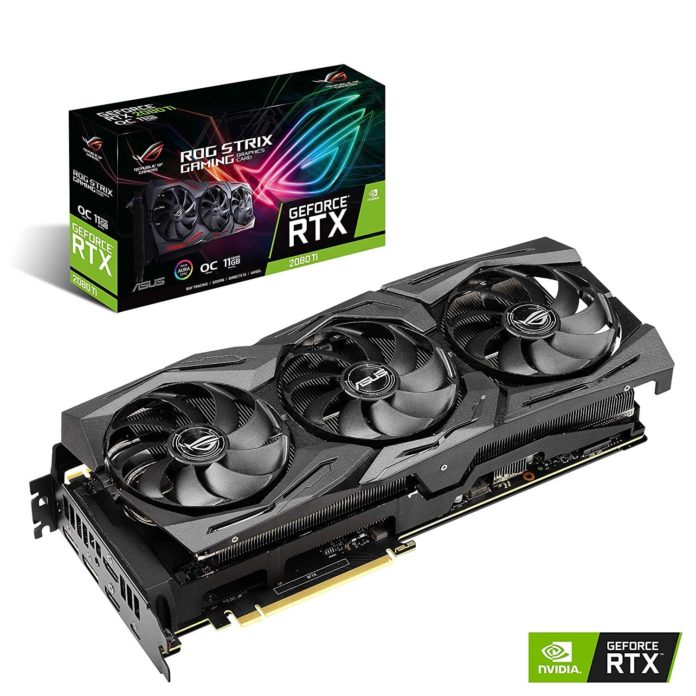We’ve tested all of NVIDIA’s RTX 20 series cards as well as AMD’s Radeon RX 5700 series GPUs. The only exception was the flagship RTX 2080 Ti, mainly because it costs a fortune and only a very small percentage of gamers can actually afford it. Today, we’ll be checking out the ASUS Strix GeForce RTX 2080 Ti which costs a rather lofty 1,24,000 INR (approx) in India with the price hovering above $1,000 in the US. At the end of the review, we’ll tell you whether the 2080 Ti is worth the big bucks or like us should you just pretend it doesn’t exist.
Test Bench
- CPU: AMD Ryzen 9 3900X
- Motherboard: ASRock Taichi X570
- GPU: ASUS Strix RTX 2080 Ti
- Memory: 8GB x2 Trident X Royal @ 3400MHz
- PSU: Corsair HX1000i
- HDD: WD Black 4TB
ASUS Strix RTX 2080 Ti Gaming Benchmarks (4K)







Yes, even the mighty RTX 2080 Ti fails to touch the 60 FPS mark at 4K ultra in certain titles. However, it is the only GPU that manages to get within a striking distance of the figure. With 50 FPS in Metro Exodus and 48 in Ghost Recon: Wildlands, it’s the only card that delivers playable performance at 4K Ultra in these titles. Granted you can drop a few settings, but that’ll also take away your bragging rights and a good chunk of your fat ego.
If you compare the ASUS Strix RTX 2080 Ti with the other high-end RTX cards, it is approximately 20% faster than the RTX 2080 Super, 25% beefier than the vanilla 2080 and ahead of the 2070 Super by around 30%. Looking at the prices, the cheapest 2080 Ti costs 85K while the cheapest 2070S costs 42K. So for twice the price, you are getting 30% more firepower. Take that as you will.
GeForce RTX 2080 Ti: Ray-Tracing Performance

On testing the ray-tracing chops of the RTX king in 4A’s Metro Exodus, we once again conclude that the Turing flagship is once again the only graphics card capable of consistent 50+FPS. Both the 2080 Super and 2070 Super fall short by a notable margin. Then again, dropping down to the high preset does deliver a
Overclocking and Thermals
Under stock conditions, the RTX 2080 Ti stays below 80 degrees, but once you crank up the core offset and memory, the GPU heats up considerably.

The thermals soar up to 85 degrees at max load at which point, the TDP cap kicks in restricting the clocks from going any further. There’s also a mild voltage limitation, but it’s mainly the power that’s the cause for the bottleneck. I reckon with some BIOS mods (under liquid cooling), this card can be pushed even higher but that’s for another day.
Overclocking results:
- Core offset: +100
- Memory offset: +500
We tested the overclocked ASUS Strix RTX 2080 Ti and were pleased to see a healthy 10-15% FPS boost across most titles. Deus Ex gained the most with a 10 FPS uplift. The rest of the titles were boosted by 6-7 FPS. This is quite impressive considering that the GPU runs into a hard power and temperature ce



Verdict: You Got 100K Lying Around Somewhere
If the GeForce RTX 2080 Ti was priced at the same point as the GTX 1080 Ti or even slightly higher, then I’d instantly recommend it. In this case, it’s not really about whether we’re recommending it or not. How many people can afford to spend over a lakh just on the GPU? Very few. But then again, considering that the Founders’ Edition costs 100K+ INR, you can’t really blame Asus for charging 124K for what is a much more superior iteration of the TU102 die.
Further Reading:



Hey can you do a test between a good 5700xt vs 2080ti in 1440p and 1080p also,so that we can figure out is it worth those extra money$
Thank you!
Yeah we’ll do it soon
Will be waiting for that????????